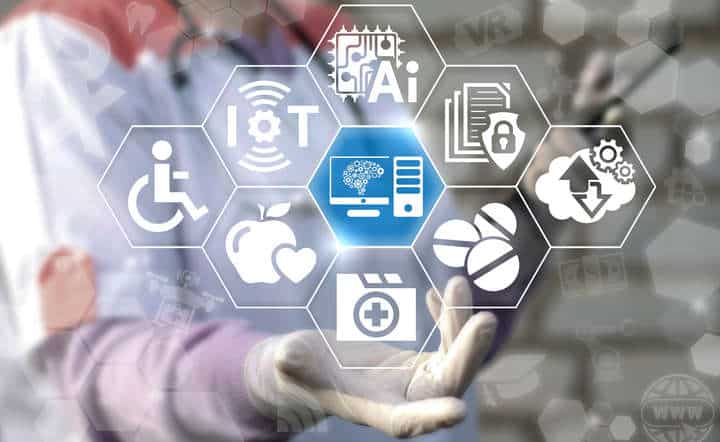Artificial Intelligence (AI) is the intelligence illustrated by machines that helps massively in our world today. It helps modify our productivity, supplements what we do, and delivers tasks that a human cannot. Machine learning (ML) is one of the most important subsets of AI and is also considered its most applicable subset. It teaches a computer to learn and process data without human interference. Arguably, it’s now becoming a vast source of data support, aiming to help achieve better results.

With how modernized the world is today, it can’t be denied that AI, specifically, ML is revolutionizing different industries. One of the industries that now rely on ML heavily in healthcare. Machine learning undoubtedly plays a significant role in health care, from medical data gathering to the development of medical procedures and treatment of some chronic diseases.
Keep reading to learn more about how ML is changing healthcare for the better.
1. Medical Imaging And Diagnostics
Radiology is a branch of medicine that uses ML in image segmentation for diagnosis and medical intervention. It helps medical practitioners see the inside structures of your body in either 2D or 3D images.
The types of medical image processing are as follows:
- Magnetic Resonance Imaging (MRI)
- Computerized Axial Tomography (CAT)
- Ultrasound Imaging (US)
- Positron Emission Tomography Scans (PET)
Medical imaging directly involves the radiology department, in which ai in radiology has significantly improved its processes. Medical imaging automatically recognizes intricate patterns of your body. Since they are taught what a healthy human organ structure is, they can detect any abnormality in the patient’s image that’s been processed. Thus, helping doctors come up with efficient decisions for its possible treatment.
2. Smart Medical Records
One of the significant factors resulting in a slow hospital transaction is the disorganized medical records. It’s exhausting to keep medical data up-to-date and consistently classify a mountain-pile of documents. The traditional way of data handling is slow and time-consuming.
Thanks to the rise of Electronic Medical Records (EMR) through ML, data access has never been this fast and accurate. Modernized data recording helps in ways that:
- Document classification is now made significantly speedy with the use of ML. Thus, requiring no manual classification of documents.
- Clinical documentation is accurate and specific that’s very beneficial in tracking the patient’s health status.
- Automated billing leads both the patients and the billing department to a fast payment management service.
- Electronic prescription is beneficial by preventing possible prescription errors. Prescribers can also monitor and quickly reconcile the patient’s medical history.
Indeed, this leads to better hospital management which is beneficial for both the patients and the healthcare workers.
3. Drug Discovery And Development
Drug discovery and development undergo a very complex process, and it is dependent on so many factors such as drug targets, chemical diversity, molecular entities, and pharmacology. It’s a process that requires adequate time and tedious study for satisfactory results.
With the help of ML in drug discoveries and studies nowadays, medicine development and production have been improved. ML supplies foundational research with rich and high-quality data to answer complicated questions. Producing the data needed during the process is vital for an effective assessment of the new drug.
ML can be applied to the different stages in drug discovery, such as the following:
- Target validation
- Identification of prognostic biomarkers
- Analysis of digital pathology data in clinical trials
- Distinguishing new uses of drugs
- Prediction of drug-protein interactions
- Assessment of drug efficacy
- Study of bioactivity of molecules
4. Prediction Of Diseases
Some radiologic equipment with advanced machine learning is also used to look for images believed to be in a disease state and predict specific medical issues. These ML-based pieces of machinery are designed to incorporate a deep learning strategy that allows neural network creation and recognition of organ-damaging cells.

These are just some of the diseases that can be predicted with the help of ML-based machines:
Cancer
Cancer is known to be one of the hardest-to-predict diseases, especially when it’s still in its initial stages. However, with the application of ML in this field, germline copy number variations are being utilized for cancer prediction through Gradient Boosting Machines (GBT).
Diabetes
Diabetes mellitus — commonly known as diabetes—is a disease that results in hyperglycemia (blood glucose is higher than the normal level) due to defective insulin secretion. It’s considered one of the most common dangerous diseases that could threaten one’s body. Algorithms like Decision Tree (DT), Random Forest (RT), and Neural Network (NN) are known to be an efficient basis in predicting diabetes. These data-mining algorithms characterize the correlation of diabetes to the significant attributes of the patients’ data.
By producing massive amounts of images and patient data, determining patterns, predictions, and early diagnosis of diseases are improved. Thus, controlling or slowing the death rate.
5. Personalized Treatment
Significant progress in medicine has been observed nowadays. ML is helping the treatment plans for each patient be customized and personalized according to one’s specific needs. It’s made possible by analyzing every patient’s medical history and pairing it with predictive analytics from the data mining algorithms provided by the ML-based machinery. Thus, generating various treatment recourse.
Conclusion
Indeed, ML is lending a big hand in the world of healthcare. With the help of the algorithms operated through ML, patient treatment is brought to the next level. Machine learning is essential for intelligent medical data and the prediction of diseases, diagnosis, personalized treatment processes, and drug discovery. These streamlined healthcare procedures should be focused on and be given sufficient attention for a better medical application.
Machine learning allows our healthcare professionals to better comprehend every person’s medical needs, from large hospitals to small clinics. With the help of ML, they can give sufficient guidance, feedback, and support, improving patient handling.





